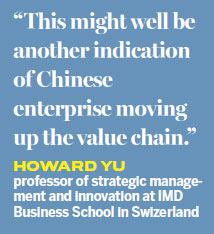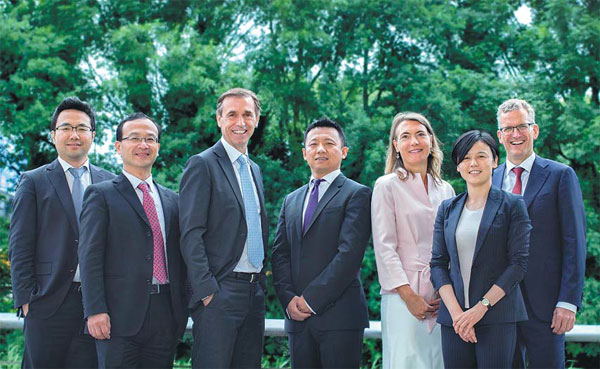Anbang turns Dutch Vivat into profit-maker
Updated: 2016-09-23 08:03
By Zhuan Ti(China Daily Europe)
|
|||||||||
Acquisition improves management efficiency and helps the century-old European company to deliver record net profits
Just one year after China's Anbang Insurance Group bought the Dutch insurer Vivat, it pulled off a surprise by turning the loss-making entity into a profitable one through its effective management and market-centric strategies.
Vivat delivered a record net profit of 578 million euros ($649 million) in the first half of 2016, according to Vivat results released on Aug 31.
|
The executive board of Vivat. The company made 578 million euros of profit in the first half of 2016. Photos Provided to China Daily |
Anbang acquired Vivat in July last year with a symbolic 1 euro and a capital investment. Vivat is the former insurance arm of Dutch financial institution SNS Reaal NV.
Anbang appreciated Vivat's history of more than 100 years and its status as one of the top six insurance companies in the Netherlands.
Christopher Bovis, professor of European and international business law at the University of Hull, says Anbang's acquisition of Vivat initially took many by surprise because of Vivat's low profitability and margin erosion due to its diluted and unfocused strategy.
Howard Yu, a professor of strategic management and innovation at IMD Business School in Switzerland, says Anbang's success with Vivat exemplifies a groundbreaking model in which the Chinese acquirer injects new management expertise into its European target, in contrast with many Chinese outbound acquirers that aim to learn from their Western targets.
Anbang's success is being hailed as a template for a successful post-merger integration that can be followed by other Chinese companies.It comes at a time when Chinese outbound acquisitions are reaching record levels.
Unlike most Chinese acquisitions, which only inject capital and leave business decisions to existing overseas management teams, Anbang became actively involved in Vivat's management and its strategic focus.
Vivat CEO Ron van Oijen says Anbang enhanced Vivat's profitability by abolishing unprofitable businesses, optimizing asset allocation and building up Vivat's core business model in products, service and channel innovation.
Anbang also ensured effective implementation of the strategies through optimization of governance, organizational structure and allocation of personnel.
"This might well be another indication of Chinese enterprise moving up the value chain," Yu says, adding that Anbang's innovative management of Vivat, with its emphasis on social media marketing and online and mobile distribution, are key to its success.

Unlike the M&A activity undertaken by Chinese companies in the resource sector in developing regions of Asia, Africa and Latin America, Anbang was able to achieve success in Europe, the birthplace of the modern financial market.
Under the management of Anbang, century-old Vivat made a quick turnaround, proving that Anbang has the advanced management experience and ability regarding international resource integration.
This indicates how Chinese companies are gradually evolving within the global marketplace. Experts think that version 1.0 of the Chinese companies relying on capital investment to gain overseas footholds has been replaced by version 2.0, in which Chinese companies export their business models and management culture.
Japanese companies were historically at the forefront of Asian advanced management, but Chinese companies like Anbang are now leading the way. Against the backdrop of the Belt and Road Initiative and sound global investment opportunities, Chinese companies will play an increasingly important role in global industry integration.
Observers believe that the Belt and Road Initiative offers an important window for Chinese companies to gain footholds overseas. So far, Anbang has made overseas M&A deals in Europe, America and Asia, establishing a solid presence in those major regions covered by the Belt and Road Initiative.
In addition to the Netherlands, Anbang's management experience has also been proven to work well in South Korea, where it acquired Tongyang Life last year. Within one year of completing the deal, Tongyang Life delivered a record performance since its foundation in 1989.
The South Korean insurer's premium income grew to 3.7 trillion won ($3.29 billion) in the first half of this year, up a whopping 90.7 percent from a year earlier. The company made 151.8 billion won in net profit, up 19 percent compared with the same period last year. Premium income and net profit fulfilled 79.6 percent and 96 percent of the annual targets, respectively.
zhuanti@chinadaily.com.cn
( China Daily European Weekly 09/23/2016 page32)
Today's Top News
State of emergency declared in US city amid protests
Universities given boost in rankings
Demand for Mandarin rises in UK
China 'capable of keeping medium-to-high growth'
Li tells Obama of opposition to THAAD deployment
Greek vows to improve refugee situation on island
UN suspends aid convoys following deadly strikes
New York bombing suspect captured in New Jersey
Hot Topics
Lunar probe , China growth forecasts, Emission rules get tougher, China seen through 'colored lens', International board,
Editor's Picks

|

|

|

|

|

|








